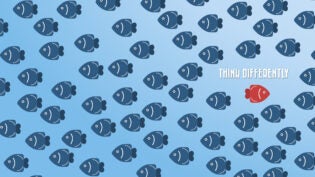
What’s the first institution that comes to mind when I list the following characteristics?
- Lack of transparency
- Lack of communication
- Lack of cooperation
- Lack of respect
You might respond, “Big Government,” and that answer would fit. But all the stereotypes we associate with Big Government can just as easily be applied to Big Business. And increasingly (and unfortunately), those same traits can also be applied to Small Business. I want to talk about how we can change that.
When any entity becomes dysfunctional, it all boils down to the same root causes: a blame game where nothing gets done, and everyone getting locked into complacency about the way things are.
The largest part of our economy is made up of small businesses, but they’re just as stuck in the mud as big business. And big business, in turn, is just as dysfunctional as the government. Why? Because even when businesses are surviving, they are not reinventing themselves.
Look at Staples, which recently closed 80 stores, with more on the chopping block. Sears Roebuck is a shadow of itself, as it tries to sell off Sears Canada, Lands’ End, and its trademark Sears auto centers. JCPenney is becoming a dinosaur, and there’s not even growth in McDonald’s, which recently reported its biggest decline in global same-store sales since 2003.
If you like Fran’s articles and want to hear more, participate in his bi-monthly live Google Hangouts, discussing important business topics for entrepreneurs. To sign up for the Hangouts, join Fran’s team today at FranTarkenton.com!
Disruptive thinking creates innovation
Our largest businesses, supposed backbones of our economy, are becoming flat and irrelevant. And all this is happening because there’s no innovation, no creativity, no disruptive thinking — which is the only way to create real change.
Instead, so-called management experts come in and fire people and close stores and cut back expenses to improve efficiency. Sure, that’s nice to show stockholders, but what are they actually doing to make the business relevant in the long term?
Small business owners like me are just as guilty as big businesses. Because we get set in thinking, “I’ve got it figured out.” We get stuck in one way to do things, one way to market, and never change. Why? Because it’s working, and it’s working at a level that’s become comfortable. I get complacent, and I get trapped in my comfort zone. There’s no disruptive thinking, because I’m not pushing myself to get smarter every day.
The only way to force disruptive thinking, the essential ingredient for innovation and reinvention, is to go out and grab it. You have to read more, you have to seek out more diverse ideas, and you have to ask more questions.
I read all kinds of different things. Every day, for example, I read The New York Times, which leans liberal, and The Wall Street Journal, which leans conservative. I read business journals and science blogs, newsletters and stock prospectuses. I read articles my friends send me. Some of what I read is in my comfort zone, but I also read a lot of things I don’t know much about, giving me a different perspective that I never would have thought of on my own. In short, I’m looking for the best thinking no matter where it comes from.
Every entrepreneur needs to have this attitude. Here’s a great example.
Recently I spent some time in Carmel-by-the-Sea, California, one of the most beautiful places in this great country (my wife and I have been vacationing there for more than 20 years). We like to browse the shops along Ocean Ave., and this time we walked into a local culinary store. I was looking around and a young kid, Billy, came up to me and asked if I had any questions. I thought to myself, “What can this kid possibly help me with?”
I politely declined and continued browsing. But a few minutes later, I found that I did have some questions, and this kid was the only person around.
So I asked him, “How old are you?”
“14,” he answered.
I gave him my questions about various products, and to my surprise Billy had all the answers! “Billy,” I said, “do your parents own this store? Is that how you know so much about it?”
“No,” he responded. “I’m just a worker.”
“Then how do you know so much?”
He answered, “I read every day. I know every item in this shop. I read the boxes; I read the labels; I know where it came from. I just keep learning so I can help the customers.”
14 years old.
Talking to Billy was inspiring, and we all can learn from his example. Push yourself. Get smarter. Read. Get out of your comfort zone so you don’t become a dinosaur. Billy knows that better than anyone, and I wouldn’t be surprised to walk down Ocean Ave. in a few years and find that Billy’s running the whole game. Billy will never be irrelevant, and neither should you.
This article was originally published by Business Insider
Published: December 17, 2014
2695 Views
2695 Views












